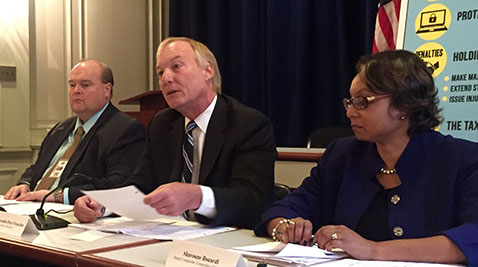
ANNAPOLIS– Maryland’s comptroller on Tuesday proposed legislation to boost penalties for tax-related crimes and increase the state’s prevention and enforcement efforts.
“Tax fraud and identity theft associated with it are a growing concern across the country as personal information becomes more and more available to perpetrators and as schemes become more and more sophisticated,” said Comptroller Peter Franchot.
Franchot, a Democrat, is responsible for Maryland’s revenues, including tax collection. His proposed Taxpayer Protection Act is designed to allow officials to better detect and prevent fraudulent tax activity.
In 2007, the comptroller’s office stopped 314 fraudulent returns worth approximately $656,000. As of the end of October 2015, the comptroller’s office has stopped 18,709 fraudulent returns totalling more than $38 million, according to Franchot.
Since he took office in 2007, the comptroller’s office has stopped approximately $152 million in tax fraud, Franchot said.
Franchot did not say how much fraudulent tax returns have cost the state.
The act would increase the statute of limitations for tax-related crimes to six years, allowing officials more time to fully investigate crimes and press charges. The current statute of limitations is three years.
Under the proposed law, people committing certain tax-related crimes would face felony instead of misdemeanor charges, according to the comptroller’s office news release.
For those tax preparers under investigation for committing fraud, officials could place injunctions to stop them from filing more returns, according to Franchot.
The act would also provide officers in the comptroller’s field enforcement division with additional powers needed to enforce tax law, including issuing subpoenas and signing charging documents, Franchot said.
The comptroller’s office has “some authority to issue administrative subpoenas,” said Jeffrey Kelly, director of the comptroller’s Field Enforcement Division. The legislation would “expand on that slightly but it will also allow for us to issue criminal subpoenas in certain types of cases, like income tax fraud.”
Enforcement Agents, as part of the Field Enforcement Division, are sworn-in police officers who investigate and enforce laws related to state revenue, according to comptroller’s website.
The increased authority would allow them to act more quickly in tax fraud cases, Kelly said.
“What we’re saying, with this legislation, is that we think there’s going to be a lot more sophisticated programs to attack agencies in states like ours and giving us this legislative authority, extra enforcement, will allow us — we estimate — to head off $20 million in prospective fraud schemes,” Franchot said.
The main goal of the act is to protect taxpayer’s money and privacy, creating a “very strong initiative going after the bad guys,” Franchot said.
According to a January report by the U.S. Government Accountability Office, in 2013 the IRS paid out approximately $5.8 billion in fraudulent tax returns.
“Nefarious people” take real personal information and send it in to receive tax returns, diverting the money from the legitimate taxpayer and into the perpetrator’s account, said Kelly.
“It’s not difficult to get a whole lot of very private information from public sources,” which large criminal organizations, working from different states or internationally, use to file fraudulent tax returns, Kelly said. “We can’t keep up with the technology they’re employing right now.”
To help protect taxpayers, the proposed act would move up the withholding date that employers are required to file their tax returns with the state from Feb. 28 to Jan. 31, according to Deputy Comptroller Sharonne Bonardi.
“Fraudsters tend to file early and unfortunately file often,” Bonardi said, so moving up the date so the comptroller’s office receives the employer tax information earlier would help deter potential fraud.
Earlier this year, Franchot took additional steps to help curb tax fraud in Maryland. In November, the comptroller’s office signed a Memorandum of Understanding with the IRS to share information to help detect refund fraud and increase security measures.


You must be logged in to post a comment.